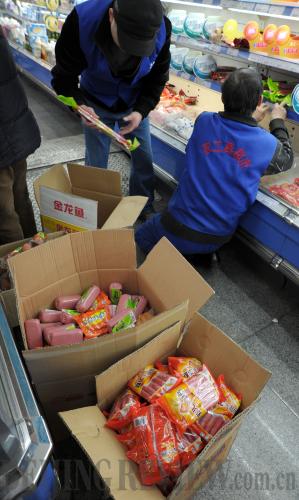|
 |
|
TOXIC SAUSAGES: Workers in a supermarket in Shanghai take meat products of Shuanghui Group off the shelf on March 16, 2011 (XINHUA) |
Counselors' Office of the State Council
The Counselors' Office of the State Council is a consultative organization directly under the State Council. Counselors of the State Council are appointed by the premier. Since it was established in 1949, about 200 counselors have worked in the office. Currently, there are 57 counselors in the office.
The majority of the counselors are well-known experts, scholars and public figures and have strong ability to participate in and deliberate state affairs. The basic responsibilities of counselors are: participating in and commenting on state affairs, offering advice, proposals and consultation on important matters of state, engaging in united front work, and promoting friendship.
Counselors do not represent any party or interest group. They directly report to and advise the premier and other leaders of the State Council. The office has played an important role in China's development in the past 50-plus years. Many scholars and celebrities have made significant contributions to China's social and economic development in the counselor's position.
Provincial governments and many municipal governments also have counselors' offices, employing a total of 900-plus counselors.
The Central Research Institute of Culture and History
The Central Research Institute of Culture and History (CRICH) was established in 1951 at the suggestion of the late Chairman Mao Zedong. Its members, also appointed by the premier, are mostly prestigious scholars, artists and eminent persons. The CRICH carries out literature and history research, and put forward suggestions to the government.
Recent Food Safety Scandals
- Dyed steamed buns
In April, Shanghai Shenglu Food Co. Ltd. was revealed to produce dyed steamed buns with chemicals such as synthetic lemon yellow dye to make wheat buns look like corn flour buns and black rice buns. The company's workers also re-labeled buns made two days earlier with new production dates, and added buns that were more than a week over their expiration dates to mixers to make "new" buns. The buns were sold in supermarkets and grocery stores in Shanghai. The plant's legal representative and four other managers confessed to illegal production and sales of 334,864 colored steamed buns worth a total of 200,000 yuan ($30,600) since January this year.
- Toxic feed additives
On March 15, Shuanghui Group, the country's largest meat producer, and several other companies were found to have used pigs fed with toxic Clenbuterol. Clenbuterol is a chemical fed to pigs to prevent them from accumulating fat. It can build up in the pig's flesh and is poisonous to humans. Shuanghui Group allegedly offered local farmers higher prices for pigs fed with the illegal additive.
- 'Gutter oil'
"Gutter oil" is usually made from discarded kitchen waste that has been refined. Although it looks clean, it actually contains toxic substances, including aflatoxin, which can cause cancer. In 2010, He Dongping, a professor of food science engineering at Wuhan Polytechnic University, revealed that about 200-300 tons of "gutter oil" is consumed in China each year, about one 10th of the total amount of oil consumed in the country.
- Melamine-tainted milk
In July 2008, 16 infants in Gansu Province who had been fed milk powder produced by Sanlu Group were diagnosed with kidney stones. By November 2008, the number of victims had exceeded 300,000, with six infants dying from damage to their kidneys caused by melamine, an organic compound that can increase the protein content of milk. Milk powder produced by Sanlu Group was found to contain 2,563 mg of melamine per kg, while the allowable amount is 15 mg.
(Source: Xinhua News Agency) | 